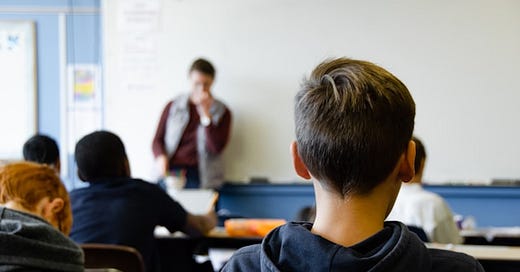*All identifying information has been changed.
The first day of school, Principal Spoors* shared the goals for each grade level. "Sixth graders, your goal is adapt: middle school is a new experience after your years in elementary school, and you'll need time to adjust to this new structure," he said.
I chuckled as I thought to myself, I guess this makes me a sixth grader, too.
It's been over 40 years since I was in sixth grade, and my experience was quite different from the kids at Wagstaff Middle School. I attended a Seventh Day Adventist school that went from kindergarten to eighth grade. In sixth grade, I had the same teacher for every subject, except for P.E., art, and music. My teacher, Ms. Twitchell, was a white woman in her 60s who wore knit pantsuits or a blouse and skirt ensemble. There was a formality to everything she did. We were the students and she was the teacher, end of discussion.
At this school, teachers regularly wear jeans and t-shirts. Several of them have visible tattoos and some have nose piercings. I hear many of them greet students as "friend." "Welcome, friends," one of the special ed teachers says to her class every morning. "Hello, friends, find your seats," the teacher on cafeteria duty says over the mic as kids tumble over each other en route to their preferred table.
I am old school, literally and figuratively. I am not about to call these students "friend"—there needs to be some line of demarcation between me and this vast group of kids, many of whom are taller than me. I dress in business casual clothes, many items I wore when visiting clients or working on-site events. On Fridays I allow myself dark blue jeans paired with the sticky polyester polo shirt with the school logo and STAFF printed on it.
Over the last two weeks, I've watched the sixth graders navigate their new school, complete with its bell schedule and changing classrooms for each subject. They are learning their routines through repetition, and some are getting braver. Others are still too nervous to deviate from what they've just barely learned. One girl looked like a deer in headlights when I asked if she would be up for taking attendance to the front office. She still wouldn't do it even after we went over the route by looking at a map. But the next student confidently took on the task, returning to class quickly and saying a quiet "you're welcome" when I thanked her for helping.
I'm adjusting to this routine, too. I wake around 5 a.m. and leave before 7:10 a.m., lunch bag in hand—a major shift after 15 years of working at home as a self-employed consultant and writer. I've taken the requisite online courses to learn disciplinary strategies, how to recognize bullying, what to do in the event of an active shooter situation. I am finding my way around the I-shaped school without relying as much on the map, and I'm gradually learning the bell schedule. There are still way too many acronyms for my brain to remember, and the teaching protocols for special ed classes require more delicacy and emotional labor than I sometimes feel equipped to handle. But like I've done many times before in my career, I observe and model what I see in other teachers, noticing what behaviors net positive results and what could use improvement.
The school doesn't allow students to use personal devices, such as phones, tablets or headphones, during the school day. As Generation Alpha, these kids struggle to keep their phones away in pocket or backpack. I keep my phone handy as I move around the school, checking the map and setting timers and alarms to alert me when I need to cover lunch or leave early for the next class. While I hate playing Phone Cop with students, I also see how my attention span and engagement has improved with my own decreased phone use. If I can adapt in this way, surely these kids with their more pliable brains can do so, too?
The sixth graders were assigned a Chromebook at the start of the school year, which they use to complete assignments using several different teaching tools. I watched a couple teachers walk their students through finding the day's lesson on their laptop. These kids don't need much time at all to adapt to technology, and seeing some of them use a keyboard had me remembering the year I spent in typing class. Any new programs or tech that I’m asked to use have a distinctive learning curve, but again, I’m adjusting.
In another two weeks, we'll all have adapted even more, me and these sixth graders. We'll strut down the halls like we own them, and hold up our heads with pride because we know where we're going and what the day holds. They'll make new friends, and if they are lucky those friendships will last for more than 40 years, like mine with Deena, Emily, Rimi, and Desi. And when the school year ends in June, we'll be ready for seventh grade.




Thank you Corinne. I love that you model after the best ideas you see. Lucky kids! Sounds like a great school.